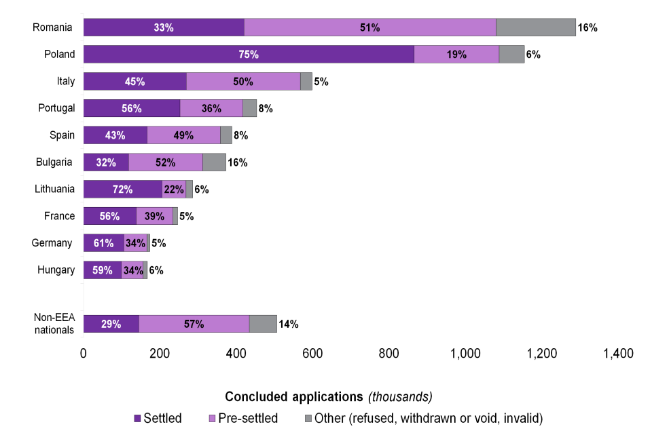Brexit & Beyond Newsletter
9 January 2023
Welcome to the 9 January 2023 Brexit & Beyond newsletter
UK Foreign Secretary James Cleverly and European Commission Vice-President Maroš Šefčovič meet today in London to discuss the Protocol. Taoiseach Leo Varadkar has made positive comments about potential changes to the Protocol. The UK Government has confirmed that border control posts will be required in Northern Ireland. There are reports that the Retained EU Law Bill may be delayed and will meet strong opposition in the House of Lords. The Independent Monitoring Authority was successful in a High Court case against the UK Home Office regarding the protection of EU citizens’ rights after Brexit. The EU and UK reached an agreement on fisheries for 2023.
The Protocol: new year, new deal?
UK Foreign Secretary James Cleverly and European Commission Vice President Maroš Šefčovič are meeting in London today for talks on the Protocol on Ireland/Northern Ireland. Secretary of State for Northern Ireland Chris Heaton-Harris will also attend. While no major breakthrough is expected today, it is hoped the meeting will give a boost to technical negotiations. Cleverly met his German counterpart Annalena Baerbock last Thursday for wide-ranging discussions. Baerbock called the Protocol dispute “the Achilles heel” of EU-UK relations.

UK Foreign Secretary James Cleverly and European Commission Vice-President Maroš Šefčovič | Source: Source: Rory Arnold / No 10 Downing Street
Taoiseach: there is “room for changes”
Leo Varadkar, who became Taoiseach in December 2022 and was Taoiseach previously when the UK and EU finally reached a deal on the Protocol, has said that mistakes were made on all sides during the Brexit negotiations. He suggested that the Protocol is a “little bit too strict”, adding that it has worked while not fully enforced (grace periods are currently in place). Varadkar thinks that there is “room for flexibility and room for changes” and said the European Commission leadership also holds that position. Varadkar said that as long as the objectives of avoiding a hard border, upholding human rights in NI, and protecting the EU single market are achieved, “I'll be as flexible and reasonable as I can be.” The European Commission has reiterated its position, saying it is “working tirelessly to facilitate the implementation of the Protocol” and said it has “shown determination to find joint solutions with the UK Government”, which work for all communities in NI. Leo Varadkar’s spokesperson subsequently sought to clarify his comments, saying it was not his intention to suggest that the Protocol text could be changed or renegotiated but that there was scope for flexibility in its implementation.
DUP leader Sir Jeffrey Donaldson welcomed the comments from the Taoiseach and said, “Whilst Mr Varadkar’s comments indicate he now recognises the political reality in Northern Ireland, we need to see a fundamental change of attitude in the negotiations if we are to see an outcome that is durable.”
Border controls at NI points of entry
On 28 December, a Minister in the UK Department for Environment Food and Rural Affairs wrote to the Lords Sub-Committee on the Protocol about the implementation of sanitary and phytosanitary (SPS) facilities in Northern Ireland. The Government’s proposed plans, which would be enabled through the Northern Ireland Protocol Bill, involve red and green channels for goods arriving in NI. Those in the red channel, destined for the EU single market, would be subject to full checks and controls. Lord Benyon states that this “will require the enhancement of existing SPS facilities at points of entry in Northern Ireland”. While the construction of such facilities is a devolved matter, the Minister states that in the absence of an NI Executive and Assembly, the UK Government will take forward this work. Currently Protocol checks are being conducted at temporary facilities. The BBC has more on the subject. A date has not yet been set for the next stage (report stage) of the NI Protocol Bill in the Lords.
Sinn Féin’s Declan Kearney said the announcement was “long overdue, but also necessary”. Ulster Unionist peer Lord Empey said the decision by the UK Government to “brush aside” the NI Department of Agriculture, Environment and Rural Affairs “illustrates the commitment the Government is making to implement the Protocol.” He added that the facilities would be “the physical manifestation of the 'Border in the Irish Sea'.”
Retained EU Law Bill: opposition and potential delay
The Times reports that the UK Government’s commitment in the Retained EU Law (REUL) Bill to review, replace or repeal over 4,000 items of EU legislation by the end of the year is seen in government as “an impossible deadline, with internal estimates that thousands of officials will have to be diverted to review legislation full time.” A senior government source told the paper it is “inevitable” that the Government will need to delay the process and make concessions on the legislation in the Lords. However, the Prime Minister’s spokesperson has said there are no plans to extend the deadline beyond the end of the year. The PM last week told reporters that "we are going to deliver" on the legislation by the end of 2023. We previously covered the impact of the REUL Bill on departments in Northern Ireland. For example, the Department of Agriculture, Environment and Rural Affairs has estimated that over 600 pieces of legislation in the department’s remit may be affected by the Bill.

Prime Minister Rishi Sunak delivering a speech last week | Source: Simon Walker / No 10 Downing Street
Opposition in the Lords
There is strong opposition to the REUL Bill in the House of Lords, including from Conservative peers. Lord Hodgson, Conservative chair of the Lords Secondary Legislation Scrutiny Committee said, “We are in danger of bringing back a lot of EU laws back to the UK and changing them without any parliamentary scrutiny, and that is not what most people understood by ‘taking back control.’” The plans for Retained EU Law were not part of the Conservative 2019 general election manifesto, which means the Bill is not protected by the Salisbury Doctrine (i.e. the Lords can obstruct the Government legislation).
Targeted approach
UK Science Minister George Freeman has told the Telegraph that the Government should have a “targeted” approach to axing Retained EU Law, saying “I’d rather be more strategic about what will really help drive growth.” He said, “There’s a huge regulatory opportunity [but] I don’t mean using Brexit as an opportunity to race to the bottom.” He proposed focusing on getting rid of the “really daft” EU regulations and putting in place “the smart regulations we need”. Freeman suggested the volume of laws which may be scrapped by the end of the year could be only 400 (of the 2,417 laws listed on the Government’s REUL dashboard, though there are reports of a further 1,400 found in the National Archives).
REUL and Northern Ireland
In a letter to the Commons Northern Ireland Affairs Committee on 14 December, Business Secretary Grant Shapps, whose department is overseeing the Bill, has responded to queries from the committee about the Retained EU Law Bill’s implications for Northern Ireland. The Minister states that the process of assessing what Retained EU Law is devolved/transferred and reserved is ongoing. He stated that “although there is no Executive in place at present, we would expect that NICS [the NI Civil Service] has also started identifying its retained EU law and now has a firm grip on the programme of work.” The Government says it intends to use Common Frameworks and the Internal Market Act to manage divergence within the UK arising from the REUL programme. More information on Common Frameworks can be found on our webpage.
The UK in a Changing Europe think tank has published an article on the REUL Bill. It highlights the scope for divergence within the UK and argues, “Better law is made when time is given to evaluate it on its merits. Further, major regulatory reform should be done through Parliament and by primary legislation.”
EU Settlement Scheme
In December, the Independent Monitoring Authority was successful in a High Court case against the UK Home Office. The IMA was set up to ensure that the rights of EU citizens in the UK are upheld post-Brexit. It challenged the position of the Home Office that EU citizens with ‘pre-settled status’ must make a further application to the EU Settlement Scheme (EUSS) or face losing their residency rights. The judge found that the Settlement Scheme as it is currently operating in this regard is unlawful. The Home Office may appeal the decision. The rights of EU citizens living in the UK and UK citizens living in the EU (who were doing so before Brexit) are protected under the Withdrawal Agreement. The EU Settlement Scheme is the UK’s system which requires those eligible to apply for residence status.
The Government published its latest statistics on the Settlement Scheme in November 2022. As of 30 September, 6,874,700 applications had been received. 2% of these were in Northern Ireland (89% in England, 5% in Scotland, and 2% in Wales).

EU Settlement Scheme: figures on concluded applications by nationality and outcome (28 August 2018 - 30 September 2022) | Source: UK Government
EU-UK agreement on fisheries
On 20 December 2022, the EU and UK reached an agreement on 2023 fishing opportunities. Under the EU-UK Trade and Cooperation Agreement (TCA), the parties conduct annual consultations on 69 jointly managed fish stocks in UK and EU waters to establish total allowable catch limits (TACs). The UK Government says the deal gives a £34 million increase in fishing opportunities for the UK fishing industry compared to last year. Fisheries was a prominent issue during the Brexit campaign, and was one of the last obstacles in reaching the trade deal. The UK now has more control of its fishing waters but there are also more administrative barriers for British companies which export fish and seafood to the EU.
Other news
- The European Commission has published further details about the extension of the grace period for veterinary medicines. It sets out obligations for the UK to ensure that supplies of veterinary medicines to Northern Ireland conform with relevant EU law and the provisions of the Protocol no later than 31 December 2025.
- The think tank Nuffield Trust has published a paper, ‘Health and Brexit: six years on’.
- The full judgement has been published of the High Court case on former Minister for Agriculture, Environment and Rural Affairs Edwin Poots’ instruction that checks on animals and agri-food at NI ports, required under the Protocol, should cease.
- The UK Government has published the provisional Resources and Waste Common Framework. Common Frameworks are being developed to manage policy areas which intersect with devolved competence, and which were previously governed by EU law. The Government has stated that finalising the frameworks is not possible without the Northern Ireland Executive in place. Scrutiny by the NI Assembly can also not currently take place. The programme has already been delayed several times.
- The Inter-Ministerial Group for Environment, Food and Rural Affairs published the communiqué for its meeting in November 2022. It notes concerns from ministers about provisions of the Retained EU Law Bill relating to devolution. Devolved ministers also raised concerns about biosecurity under the Government’s proposals for UK borders. The Scottish Government is exploring whether an exclusion to the UK Internal Market Act is required for its proposed Deposit Return Scheme.
- The House of Commons has published a report on UK-EU trade statistics. Northern Ireland had the highest percentage of good exports to the EU of the countries and regions in the UK; it also had the highest percentage of good imports from the EU. The paper finds that the pandemic, Brexit, and related trade disruptions saw the value of UK trade with the EU contract sharply between 2019 and 2020, before recovering somewhat between 2020 and 2021.
- The Senedd Economy, Trade and Rural Affairs Committee published a report on Common Frameworks. It includes recommendations on managing divergence within the UK, and managing the impact of the Retained EU Law Bill. Scottish Parliament Research has published an article considering the views from the House of Lords and Scottish Parliament on the Common Frameworks programme.
- On 20 December, the Government published its Report on Intergovernmental Relations for Q3 2022. The UK-EU Interministerial Group met in July and discussed the implementation of the Trade and Cooperation Agreement, and the Protocol on Ireland/Northern Ireland. The UK Government “recognised the importance of continued engagement with devolved governments as the legislation [NI Protocol Bill] makes progress through Parliament.”



